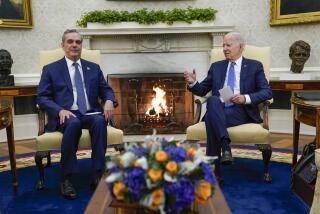China joins American development bank
- Share via
BOGOTA, COLOMBIA — In the latest sign of China’s increasing economic stake and political muscle in Latin America, the Asian giant is joining a Washington-based international bank that finances development projects throughout the region.
China’s membership in the Inter-American Development Bank, announced Thursday, is expected to increase the nation’s profile and influence in a part of the world that historically has been under the sway of the United States.
China will invest $350 million in the bank and assume a role in its socially conscious projects, including efforts to mitigate poverty and global warming and to provide potable water, infrastructure improvements and micro-credit, bank President Luis Alberto Moreno said in an interview.
Analysts saw the move as providing the Chinese with a new forum to meet Latin American decision-makers and improve Beijing’s image in the region.
Analyst Gary Hufbauer, senior fellow at the Peterson Institute for International Economics in Washington, said the Chinese could be seeking to outflank the United States in its own backyard.
“The U.S. is well prepared to meet Chinese challenges in the Taiwan Strait or the high seas,” Hufbauer said. “It is poorly prepared to grapple with Chinese financial diplomacy, both because ‘our’ institutions -- the International Monetary Fund and the World Bank -- are small potatoes compared to the Chinese war chest, and because Americans don’t think of national security in financial terms.”
The importance of Latin America and the Caribbean to China is evident in growing trade, which has jumped thirteenfold since 1995, to $110 billion last year.
The Asian nation is now the region’s second leading trade partner, after the United States.
Over the same period, U.S. trade with Latin America grew more slowly from a larger base. Trade between the two reached $588.4 billion in 2007, up from $201 billion in 1995.
“Membership in the [bank] is only one indicator of Beijing’s pocketbook diplomacy,” Hufbauer said.
“China has already been at work in Africa and Asia, and the global financial crisis will create abundant vineyards for future pickings.”
China has announced plans to set up a sovereign fund to invest $200 billon in projects abroad, and Latin America could receive a significant share.
At the 2004 Asia-Pacific Economic Cooperation summit in Chile, China promised to invest $100 billion in Latin America over the next decade. After a slow start, Chinese money is starting to flow to projects such as a $3-billion steel factory going up near Rio de Janeiro, the largest single Chinese project in the region.
China has also established a multibillion-dollar social investment fund with leftist Venezuelan President Hugo Chavez, with whom it is about to launch a communications satellite.
China has looked increasingly to Latin America, which is rich in soy, wheat, corn, iron ore, copper and oil, for commodities to help expand its industrial base and provide for its increasingly affluent citizens.
Beijing has acquired oil assets in Ecuador, paying $1.4 billion in 2006, and bought a stake in an oil production company in Colombia.
China typically stays out of politics in countries where it invests.
“They aren’t converting anyone to communism because they don’t believe in it themselves,” said University of Miami professor Michael Connolly.
But China does have an agenda in Latin America, said Evan Ellis at the consulting firm Booz Allen Hamilton in Arlington, Va.
China is irked by the diplomatic recognition of Taiwan by 12 Central American and Caribbean nations, he said, and could use the bank forum to lobby against such diplomacy.
--
More to Read
Sign up for Essential California
The most important California stories and recommendations in your inbox every morning.
You may occasionally receive promotional content from the Los Angeles Times.










